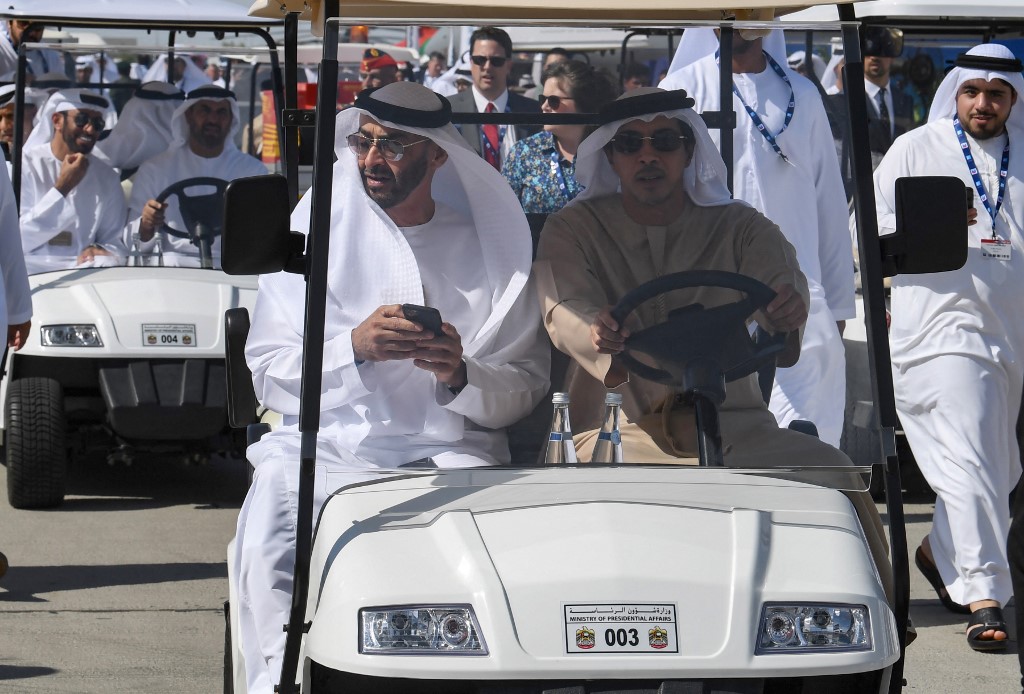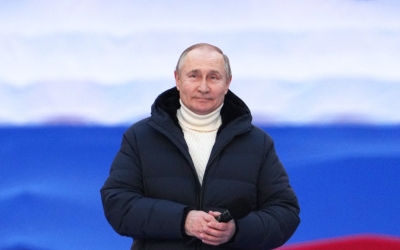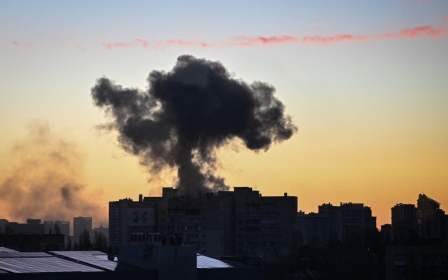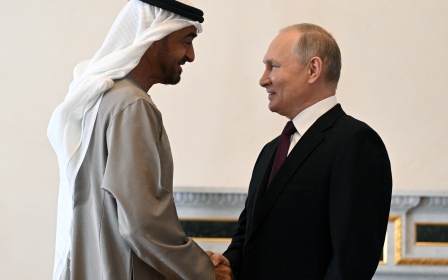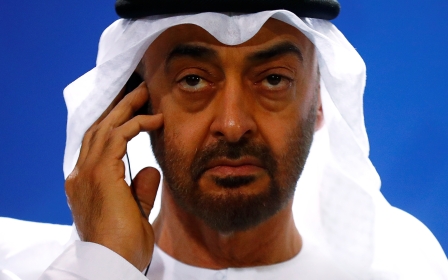Why Emirati statecraft needs Putin's networks
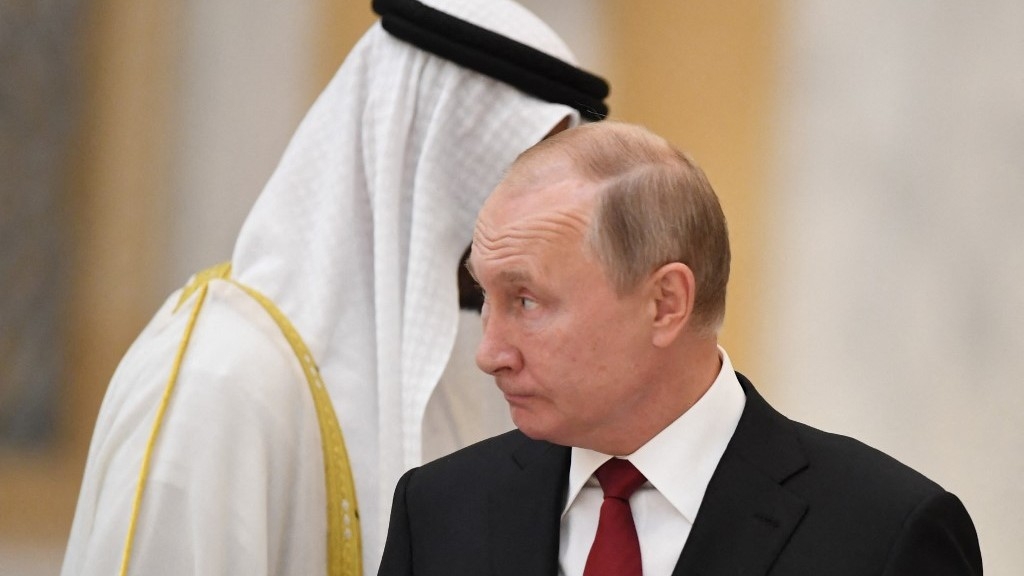
Since the beginning of the war in Ukraine, the monarchies of the Gulf - first and foremost the United Arab Emirates - have found themselves in a pickle to downgrade their relations with Russia, or possibly face sanctions in a war that for most Gulf states is far away.
Abu Dhabi and Dubai have become key hubs for Russian financial, economic and geo-strategic networks. And while Abu Dhabi has tried to use these networks to position itself as a broker in Ukraine, policymakers in Washington, London and Brussels are growing increasingly uneasy about the UAE's apparent role as Moscow's conduit.
Strategy as the 'art of creating power' has been redefined in Abu Dhabi since the ascent to power of Mohammed bin Zayed and his direct brothers
Looking beyond the short-term risks of alienating western partners, however, Abu Dhabi's network-centric approach to Russia is showcasing a new, innovative way of redesigning statecraft.
Imagine you were a monarchy in the Gulf that by all conventional standards was considered small (in terms of population, territory and GDP). More than that, imagine you were wedged in between states that by the same conventional standards would be considered much bigger. How would you secure the survival and prosperity of your nation? It would require an unconventional approach to re-orchestrating national power and influence.
In a hyperconnected, network-centric world, new means and ways of creating power have arisen. As international relations are no longer just shaped by the activities of states, but increasingly by the flows of information, people and capital beyond the control of the state, the UAE has expanded statecraft beyond the limited in-house capacities of its state bureaucracy.
New MEE newsletter: Jerusalem Dispatch
Sign up to get the latest insights and analysis on Israel-Palestine, alongside Turkey Unpacked and other MEE newsletters
The apparent diffusion of power away from bloated, state-centric and hierarchically organised bureaucracies has offered opportunities to orchestrate power and influence through public-private networks whose nodes seem to operate independently of the state.
Surrogates and intermediaries
Strategy as the "art of creating power" has been redefined in Abu Dhabi since the ascent to power of Mohammed bin Zayed and his direct brothers - the so-called Bani Fatima of Abu Dhabi's royal family. They have created power through the delegation of statecraft to networks of surrogates and intermediaries to boost the agility, reach and control of their inner circle.
It has allowed them to reconstitute power through the orchestration of public, private and semi-private networks of influence that comprise individuals, organisations, corporations and elite circles. The UAE's network-centric statecraft allows the Bani Fatima to directly tap into other global networks and tie their nodes directly or indirectly to their power hub in Abu Dhabi. Mohammed bin Zayed's brothers, Mansour and Tahnoon bin Zayed, have been particularly instrumental in trying to direct flows of information, people and capital to the shores of the Gulf.
Russia has been a particular target for the Bani Fatima's network-building - not least since Russian monies have been looking for new safe havens after Moscow's decision to invade Ukraine. Similar to the UAE, Russian statecraft under President Vladimir Putin has been delegated to trusted individuals and organisations that are tied directly into the power hub of the Kremlin. It is thus not surprising that Russian-Emirati networks have been integrating at an ever-faster pace in recent years.
Mansour and Tahnoon bin Zayed have actively used their various Abu Dhabi-based vehicles to create opportunities for network building. Beyond the obvious nodes in the energy sector, such as Abu Dhabi National Oil Company, various banking vehicles have facilitated access for Kremlin interlocutors to global financial markets after the West imposed sanctions on Russia.
At least 38 businessmen and officials close to Putin's inner circle reportedly own 76 properties worth more than $314m in Dubai alone - among them Alexander Borodai, Russia's former secessionist leader in Ukraine's Donetsk region, and Ruslan Baisarov, one of Russia's wealthiest businessmen and chief financier of Chechen leader Ramzan Kadyrov, who himself is a close personal friend of Mohammed bin Zayed.
Aside from helping key Kremlin nodes put their monies into Emirati concrete, Mansour, who also chairs the UAE's central bank, has provided Russian banks with an operating license in the Emirates, opening new channels for the flow of money from Russia to the UAE.
Vast global network
Tahnoon bin Zayed's vast semi-private business empire, run by trusted technocrats, has long worked side-by-side with Mansour's financial networks to forge economic and trade networks with Russia. Already prior to the Ukraine war, this empire was facilitating market entry for Russian businesses.
A peculiar case has been Russia's Wagner Group - a state within a state - comprised of a network of different companies and intermediaries who, aside from their mercenary activities across Africa and Ukraine, have been involved in extractive industries and aviation. One key node in Wagner's business network has been Kratol Aviation, a UAE-based company likely operating in the country with tacit approval from the Bani Fatima. Kratol Aviation helped Wagner ship personnel and weapons across the African theatre.
Meanwhile, US intelligence reports suggest that Wagner has used financial networks in the UAE to help bankroll its operations. Moreover, Wagner, which was paid for its services in Sudan through extractive concessions, reportedly used the UAE as a leading hub for the global gold trade, exchanging illicitly extracted metal for hard currency.
But what are the Bani Fatima getting in return? Abu Dhabi is becoming an indispensable hub for a range of nodes in a vast global network of movers, shakers and shifters. For the great power Russia, the seemingly small state of the UAE has developed into a crucial gateway into Africa and the Middle East, as well as a financial haven through which Putin's regime maintains access to global markets.
These networks create dependencies that Abu Dhabi can use as leverage. They not only tie in Russia to the Bani Fatima, but make Emirati networks ever-more attractive to other great powers, such as China and the United States. In a multipolar world, Abu Dhabi is using the influence it gains to bargain and to broker advancing the interests first of the Bani Fatima, and by extension, the national interests of the Emirates.
These networks then provide flexible, and most importantly, clandestine means and ways of statecraft that have transformed Abu Dhabi from a passive small state overly dependent on the US, to an assertive player on the regional stage with whom great powers need to engage - whether they want to or not.
The views expressed in this article belong to the author and do not necessarily reflect the editorial policy of Middle East Eye.
Middle East Eye delivers independent and unrivalled coverage and analysis of the Middle East, North Africa and beyond. To learn more about republishing this content and the associated fees, please fill out this form. More about MEE can be found here.



